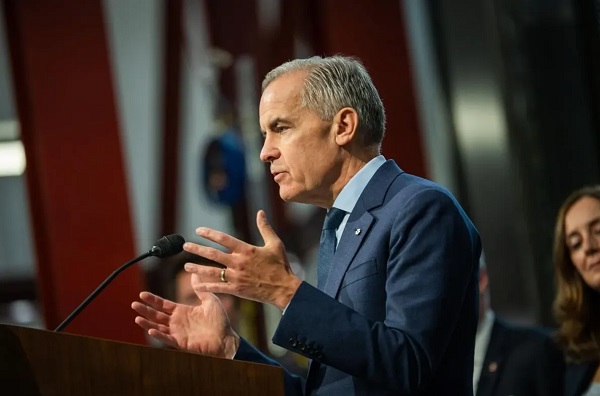Alberta
Thousands of Albertans march to demand independence from Canada

From LifeSiteNews
Thousands of Albertans marched upon the province’s capital of Edmonton this past Saturday in the “I Am Alberta Rally,” calling for the province to immediately secede from Canada in light of increasing frustration with the Liberal federal government.
The rally saw an estimated 20,000 to 30,000 people march on the steps of the Alberta legislative building, demanding that a referendum be held at once to allow Alberta to leave Canada.
“We can’t delay. We can’t slow down,” well-known freedom lawyer Keith Wilson said at the rally as he spoke to the crowd.
“This is our moment. This is our future. For our families, for our children, for Alberta. Alberta will be free.”
The group behind the rally, the Alberta Prosperity Project (APP), bills itself as a sovereignty advocacy group. As reported by LifeSiteNews earlier this year, the APP wants to put Alberta independence to a question to the people via a referendum.
The rally also comes after certain members affiliated with the APP such as Jeffrey Rath and Dr. Dennis Modry earlier the month met in Washington, D.C. with cabinet-level U.S. politicians to discuss Alberta’s potential independence from Canada.
U.S. President Donald Trump has routinely suggested that Canada become an American state in recent months, often making such statements while talking about or implementing trade tariffs on Canadian goods.
The APP on July 4 applied for a citizen-led petition presented to Elections Alberta that asks, “Do you agree that the Province of Alberta shall become a sovereign country and cease to be a province in Canada?”
The group is hoping to have the referendum on the ballot as early as next year and has accused the Liberal federal government of encroaching on Alberta’s ability to manage its own affairs.”
The group says an independent Alberta would allow it to “keep our resources, grow our economy, and reinvest in Alberta families, businesses and infrastructure.”
As it stands now, the referendum question has been referred to the courts to see whether or not it can proceed.
Alberta Conservative Premier Danielle Smith does not support a fully independent Alberta. However, she does advocate for the province to have more autonomy from Ottawa.
As reported by LifeSiteNews, Smith said her conservative government will allow but not support a citizen-led referendum on independence.
Despite not advocating for an outright separate Alberta, Smith’s government has not stood still when it comes to increasing provincial autonomy.
Smith’s United Conservative government earlier this year passed Bill 54, which sets the groundwork for possible independence referendums by making such votes easier to trigger. The bill lowers the signature threshold from 600,000 to 177,000.
As reported by LifeSiteNews last week, Smith’s government introduced a new law to protect “constitutional rights” that would allow it to essentially ignore International Agreements, including those by the World Health Organization (WHO), signed by the federal Liberal government.
The calls for independence have grown since Liberal leader Mark Carney defeated Conservative rival Pierre Poilievre.
Carney, like former Prime Minister Justin Trudeau before him, said he is opposed to new pipeline projects that would allow Alberta oil and gas to be unleashed. Also, his green agenda, like Trudeau’s, is at odds with Alberta’s main economic driver, its oil and gas industry.
Alberta
Premier Smith sending teachers back to school and setting up classroom complexity task force

Taking action on classroom complexity
As schools reopen, Alberta’s government is taking action by appointing a class size and complexity task force to meet the challenge of increasingly complex classrooms.
Across Alberta, teachers are seeing more students with diverse learning needs and behavioural challenges, while incidents of classroom aggression are rising. To address these challenges head on, and in response to concerns raised by teachers, Alberta’s government will be appointing a Class Size and Complexity Task Force.
We recently formed the Aggression and Complexity in Schools Action Team to identify practical classroom focused solutions. Alberta’s government has received the action team’s draft final report and will use its recommendations to create a roadmap for safer classrooms. Alberta’s government will release the final report, and the task force will implement solutions, work with school boards to gather more data on classroom complexity and begin work to replace the 2004 Standards for Special Education.
“Teachers have made it clear that addressing classroom complexity and safety are among the most critical improvements needed in our education system. We are taking real action to meet those needs by strengthening classroom supports, hiring more teachers and educational assistants, and acting on the recommendations of the Aggression and Complexity in Schools Action Team. Parents, teachers and students all want the same thing – safe and supportive classrooms where every child can succeed.”
Teachers are vital to the success of Alberta’s education system. Over the next three years, school boards will be provided with funding to hire 3,000 teachers and 1,500 new education assistants to support students with complex needs. These funds may also be allocated to additional student support through assessments for complex needs, occupational therapy, physiotherapy or speech-language pathology, and other in-the-classroom supports.
“No teacher should ever be harmed while doing their job. We know that aggressive incidents have gone up sharply in recent years, and classrooms are becoming more complex. That’s why we’re doubling down on efforts to make classrooms safer and to give extra support to students who need it. Our goal is to create learning environments where every student can succeed.”
In November, Alberta’s government will work with school boards to gather information and data about class sizes and composition to ensure students are receiving the support they need. Information will be made available as soon as it is available and will be released annually thereafter.
Quick facts
- Between July and September 2025, the action team conducted engagement sessions with teachers, education partners and school boards through in-person and virtual sessions.
- This included front-line educators, families, disability organizations, community agencies, early learning experts and social service professionals.
- Budget 2025 included $55 million to help address classroom complexity – a 20 per cent increase from the previous year.
Getting Alberta’s kids back to school
If passed, Bill 2, the Back to School Act, will restore stability in Alberta’s education system and ensure students can return to learning without further disruption.
The ongoing teachers’ strike has disrupted classrooms across Alberta, setting back student learning and deepening achievement gaps. Each day schools remain closed, students lose critical instructional time, routine and support. This proposed legislation will end the strike and establish reasonable terms for a new teacher collective agreement.
“This strike has gone on long enough. It’s clear there’s no path forward unless we act. The Back to School Act refocuses everyone on what matters most, the education of Alberta’s students. Bill 2 puts students back at the centre of our system, while we continue to work with teachers and families to build lasting stability in Alberta’s schools.”
The Back to School Act legislates the terms of the September 2025 tentative agreement, which provided a 12 per cent salary increase over four years, additional market adjustments of up to 17 per cent for most teachers, and the hiring of 3,000 teachers and 1,500 educational assistants. The collective agreement will be in effect from Sept. 1, 2024, to Aug. 31, 2028.
“The time for labour stability is now. This legislation provides a positive path forward despite an interrupted school year. This is a necessary step and the most responsible decision for kids, teachers and parents. If Bill 2 is passed, it is my hope that classes will resume as soon as Wednesday, October 29.”
The last deal put on the table by the Alberta Teachers’ Association demanded an additional $2 billion from government. This was a clear display that the union had no intention to bargain in a reasonable manner with the government and present a fair offer.
“We believe invoking the notwithstanding clause is a necessary measure to end the undue hardship caused by the teacher strike. This strike has reached a point that is causing irreparable harm on student learning. Our government will not hesitate to use every available legal tool in defence of students.”
This legislation is the only responsible path forward to restore stability, protect students and ensure Alberta’s classrooms focus back on learning. Alberta’s government remains fully committed to strengthening the education system, supporting teachers, and putting the success and well-being of students at the heart of every decision made.
Key facts
- Bill 2 would end the province-wide teachers’ strike and legislates a new collective agreement.
- The agreement covers Sept. 1, 2024, to Aug. 31, 2028 and provides:
- A 12 per cent salary increase over four years.
- Additional market adjustments of up to 17 per cent for 95 per cent of members.
- 3,000 new teachers and 1,500 educational assistants to reduce class sizes and enhance support.
- These terms reflect the September 2025 tentative agreement recommended by the Alberta Teachers’ Association leadership.
- The legislation includes financial penalties for non-compliance and suspends local bargaining during the agreement to ensure labour stability through 2028.
Alberta
Coutts border officers seize 77 KG of cocaine in commercial truck entering Canada – Street value of $7 Million

News release from RCMP Federal Policing Northwest Region
Calgary resident charged with attempted drug importation
Canada Border Services Agency (CBSA) officers at the Coutts port of entry found nearly 77 kg of cocaine with an estimated street value of $7 million during a secondary examination of a commercial truck seeking entry into Canada from the United States. The CBSA arrested the driver, a resident of Calgary.
The Integrated Border Enforcement Team in Alberta, a joint force operation between the RCMP Federal Policing Northwest Region, CBSA and Calgary Police Service, was notified and a criminal investigation was initiated into the individual.
Surj Singh Salaria (28), a resident of Calgary, was arrested and charged with:
- Importation of a controlled substance contrary to section 6(1) of the Controlled Drugs and Substances Act;
- Possession of a controlled substance for the purpose of trafficking contrary to section 5(2) of the Controlled Drugs and Substances Act; and,
- Attempting to export goods that are prohibited, controlled or regulated contrary to section 160 of the Customs Act.
Salaria is scheduled to appear in Lethbridge Provincial Court on Oct. 27, 2025.
“The CBSA remains vigilant in preventing dangerous drugs from reaching our communities. This significant seizure shows CBSA’s detection capabilities and the important role our officers play to stop drug trafficking. We are committed to securing and protecting the border alongside our law enforcement partners.”
- Janalee Bell-Boychuk, Regional Director General, Prairie Region, Canada Border Services Agency
“Through coordinated efforts between law enforcement agencies, a substantial quantity of cocaine was seized before it could reach communities across Alberta. This investigation reinforces the value of a secure border and the vital role that collaboration and intelligence-sharing play in safeguarding the public from the harms of illegal drug trafficking.”
- Supt. Sean Boser, Officer in Charge of Federal Serious and Organized Crime and Border Integrity – Alberta, RCMP Federal Policing Northwest Region
“This investigation highlights the strength of our collaborative efforts through the Integrated Border Enforcement Team. By working together with our law enforcement partners, we are able to disrupt the flow of illegal drugs and protect our communities from the violence and harm associated with organized crime.”
- Acting Supt. Jeff Pennoyer, CPS, Criminal Operations & Intelligence Division
IBET’s mandate is to enhance border integrity and security along the shared border, between designated ports of entry, by identifying, investigating and interdicting persons, organizations and goods that are involved in criminal activities.
-

 MAiD2 days ago
MAiD2 days agoDisabled Canadians increasingly under pressure to opt for euthanasia during routine doctor visits
-

 Alberta2 days ago
Alberta2 days agoPetition threatens independent school funding in Alberta
-

 Business2 days ago
Business2 days agoCanada Revenue Agency found a way to hit “Worse Than Rock Bottom”
-

 Digital ID2 days ago
Digital ID2 days agoToronto airport requests approval of ‘digital IDs’ for domestic airport travel
-

 Media2 days ago
Media2 days agoCarney speech highlights how easily newsrooms are played by politicians
-

 Opinion2 days ago
Opinion2 days agoCarry-On Carney And The Trials Of Brian Peckford
-

 Opinion2 days ago
Opinion2 days agoA Nation of Announcements: Canada’s Government of Empty Promises
-

 Health2 days ago
Health2 days agoDMSO Heals the Eyes and Transforms Ophthalmology






